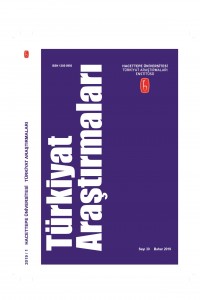Öz
Moğolistan’ın
kuzeyinde yaşayan ve Türk dil ailesinden bir dil konuşan Duhalar bugün geriye
kalmış yaklaşık 200 birey ile halâ göçer yaşam tarzını devam ettirmek için
mücadele veriyorlar. Rengeyikleri ile dört mevsim taygada(kuzey ormanları)
yaşayan Duhalar, asıl geçim biçimi olarak avcılık ve toplayıcılık ile
yaşamlarını sürdürüyorlar. Rengeyiklerini binek ve yük hayvanı olarak kullanıp,
sütünü sağıyorlar ancak zorunda kalmadıkça az sayıdaki kıymetli rengeyiklerini
kesip yemiyorlar. Bu makalede asıl geçim biçimi olarak avcılık yapan Duhalarda
av etinin nasıl paylaştırıldığı incelenecektir. Av etinin paylaşılması kuralı
birçok avcı toplayıcı toplumda rastlanan bir kuraldır. Makalede Duhaların bu
paylaşımı nasıl gerçekleştirdiği, avı vuran kişinin et üzerindeki hakkı, ava
katılmayan ailelerin payına düşen hak ve tüm bu ilişkiler zincirinde avcının
nasıl güç kazanıp diğerlerini ezmesi engellenirken, bir yandan da gelecek
avlarda aynı başarıyı sürdürmesi için motive edildiği gibi konulara
antropolojik açıdan değinilecektir. Avcı toplumlarda etin hayvanı vuran kişiye
ait olup olmadığı ve paylaşım kurallarının sosyal ilişkilerde ne gibi bir
işlevi olduğunu anlamak bu makalenin asıl amacıdır. Veriler Duhalar arasında Temmuz-
Eylül 2012, Şubat 2013, Şubat- Haziran 2015 ve Ekim- Aralık 2016 yıllarında
gerçekleştirdiğim alan araştırmasında on bir ay boyunca taygada yaşayarak
yaptığım katılımcı gözlem ve derinlemesine mülakat yöntemlerine dayalıdır.
Anahtar Kelimeler
Duhalar göçerler avcılık tayga paylaşım Moğolistan Türkdilleri
Kaynakça
- Altman J. & Petersen N. (1988). Rights to game and rights to cash among contemporary Australian hunter-gatherers. Ingold,T., Riches &Woodburn, Hunters and Gatherers Property, Power and Ideology Volume 2 içinde (ss.75-94). Newyork: Berg
- Bird-David, N. (1990). The giving environment: Another perspective on the economic system of gatherer-hunters. Current Anthropology, 31(2), 189-196.
- Dowling, J. H. (1968). Individual ownership and the sharing of game in hunting societies. American Anthropologist, 70, 502—507
- Gowdy, J. (1999) Hunter-Gatherers and the mythology of the market. R. B.Lee & R. Daly , Cambridge Encylopedia of Hunters and Gatherers içinde (ss. 391-398). Cambridge: Cambridge University Press.
- Hamayon, R. (2012). The Three Duties of Good Fortune. 'Luck' as a Relational Process among Hunting Peoples of the Siberian Forest in Pre-Soviet Times. Social Analysis , 56, 25-32.
- Ingold, T. (1980). Hunters, pastoralists and ranchers: Reindeer economies and their transformations. New York: Cambridge University Press.
- Kelley, R. L. (1995). The foraging spectrum: diversity in hunter-gatherer life- ways. Washington, DC: Smithsonian Institution Press.
- Lee, R. B . (1979). The !Kung San: men, women, and work in a foraging society. New York: Cambridge University Press
- Lee, R.B. (2005). Power and Property in Twenty-First Century Foragers A Critical Examination. T. Widlok & W. G. Tadesse , Property and Equality, Volume 2, Encapsulation, Commercialisation and Discrimination içinde. London: Berghahn Books.
- Marshall, L. (1961). Sharing, talking, and giving: relief of social tensions among !Kung bushmen. Africa 31(3), 231–249.
- Nadasdy, P. (2007). The Gift in the Animal: The Ontology of Hunting and Human-Animal Sociality. American Ethnologist, 34(1) , 25-43.
- Paine, R. (1971). Animals as Capital: Comparisons among northern nomadic herders and hunters. Anthropological Quarterly, 44(3). Comparative Studies of Nomadism and Pastoralism (Special Issue), 157-172.
- Peterson, N. (1993). Demand sharing: Reciprocity and the pressure for generosity among foragers. American Anthropologist, 95(4), 860–874. Woodburn, J. (1982). Egalitarian societies. Man, New Series, 17(3), 431-451.
Öz
Kaynakça
- Altman J. & Petersen N. (1988). Rights to game and rights to cash among contemporary Australian hunter-gatherers. Ingold,T., Riches &Woodburn, Hunters and Gatherers Property, Power and Ideology Volume 2 içinde (ss.75-94). Newyork: Berg
- Bird-David, N. (1990). The giving environment: Another perspective on the economic system of gatherer-hunters. Current Anthropology, 31(2), 189-196.
- Dowling, J. H. (1968). Individual ownership and the sharing of game in hunting societies. American Anthropologist, 70, 502—507
- Gowdy, J. (1999) Hunter-Gatherers and the mythology of the market. R. B.Lee & R. Daly , Cambridge Encylopedia of Hunters and Gatherers içinde (ss. 391-398). Cambridge: Cambridge University Press.
- Hamayon, R. (2012). The Three Duties of Good Fortune. 'Luck' as a Relational Process among Hunting Peoples of the Siberian Forest in Pre-Soviet Times. Social Analysis , 56, 25-32.
- Ingold, T. (1980). Hunters, pastoralists and ranchers: Reindeer economies and their transformations. New York: Cambridge University Press.
- Kelley, R. L. (1995). The foraging spectrum: diversity in hunter-gatherer life- ways. Washington, DC: Smithsonian Institution Press.
- Lee, R. B . (1979). The !Kung San: men, women, and work in a foraging society. New York: Cambridge University Press
- Lee, R.B. (2005). Power and Property in Twenty-First Century Foragers A Critical Examination. T. Widlok & W. G. Tadesse , Property and Equality, Volume 2, Encapsulation, Commercialisation and Discrimination içinde. London: Berghahn Books.
- Marshall, L. (1961). Sharing, talking, and giving: relief of social tensions among !Kung bushmen. Africa 31(3), 231–249.
- Nadasdy, P. (2007). The Gift in the Animal: The Ontology of Hunting and Human-Animal Sociality. American Ethnologist, 34(1) , 25-43.
- Paine, R. (1971). Animals as Capital: Comparisons among northern nomadic herders and hunters. Anthropological Quarterly, 44(3). Comparative Studies of Nomadism and Pastoralism (Special Issue), 157-172.
- Peterson, N. (1993). Demand sharing: Reciprocity and the pressure for generosity among foragers. American Anthropologist, 95(4), 860–874. Woodburn, J. (1982). Egalitarian societies. Man, New Series, 17(3), 431-451.
Ayrıntılar
| Birincil Dil | Türkçe |
|---|---|
| Bölüm | Makaleler |
| Yazarlar | |
| Yayımlanma Tarihi | 6 Temmuz 2019 |
| Gönderilme Tarihi | 6 Eylül 2018 |
| Yayımlandığı Sayı | Yıl 2019 Sayı: 30 |


